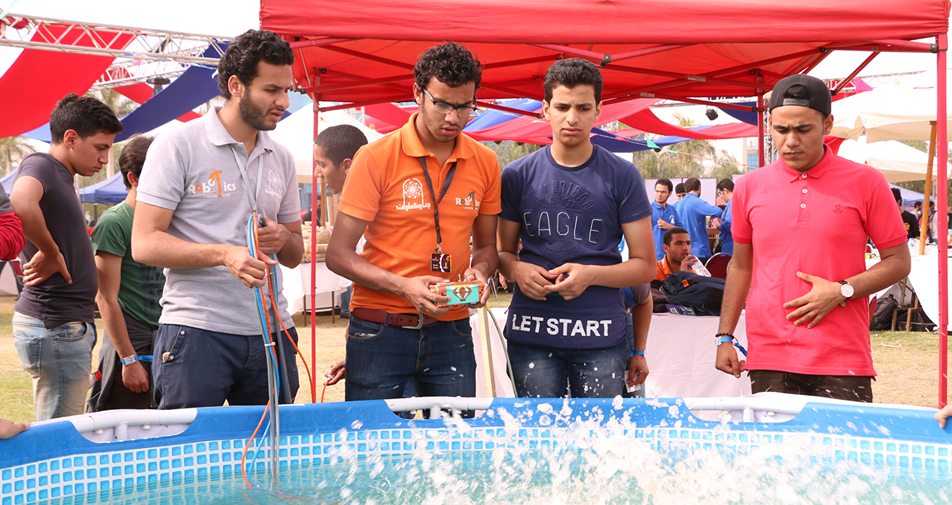Cairo’s Maker Faire enchants children, adults, and Minions

Over 11,000 people attended the Maker Faire Cairo over the weekend, making it one of the biggest tech events in the region.
The event has a wide appeal: ‘makers’, children, entrepreneurs, university students and professionals gathered on Saturday in the Smart Village outside Cairo, surrounded by the offices of local and international tech giants - and an artificial lake.
Participants showed off their flying drones and 3D printers, paper musical instruments that, when connected to laptops, actually worked, and plastic artificial limbs that are cheaper and lighter than traditional ones.

Suzanne Miller, regional information resource officer at the US embassy in Cairo, which has partnered with Maker Faire Cairo, said people came to think creatively, explore what others were doing, and have fun.
“The idea of ‘making’ is extremely important, it promotes creativity, learning, technology and innovation, which we believe will help to create jobs and solutions for Egypt,” she said.
As the voices of the speakers at multiple simultaneous sessions combined with the strains of pop music from a band, Miller said the huge number of people who’d attended the one day event was “because this is the place to meet entrepreneurs and people with ideas”.
Watch out tech entrepreneurs, the kids are coming

Cosplayers dressed as The Avengers stood side by side with Batman, but the more precocious kids were uninterested in these playful affairs - they were keen to pitch their projects.
Mostafa Ehab, an 11th grade student at STEM School (science, technology, engineering and mathematics) in Maadi, was showcasing a prototype for his project, which is a hydro-powered tracking device that orients solar panels towards the sun as it moves during the day.
“Solar trackers, installed at solar panels to improve their efficiency, are not something new, but they are usually operate using electricity, which we already want to generate through solar panels… so something was illogical in that regard,” Ehab told Wamda.
Presenting a device that moves up and down according to the movement of a mass of water, Ehab hoped his project would be cost-effective to solar industry players - he’d already spoken with Solarize Egypt CEO Yassin Abdel Ghaffar before the fair about ways to develop his idea.
Armed with a business plan, 12th grader Abdel Rahman Rashid from 6th October city had developed a technology that combines rice husk ash (RHA) with recycled cement remnants to produces new cement but without using gas in the process.
Rashid told Wamda that the technology, which he’d registered at the Patent Office, reduces prices of cement to $50 per tonne down from current market levels of $90 per tonne.
“This technology doesn’t require having a separate factory, but it can be incorporated into an existing factory line,” Rashid said.
The Maker Faire’s educational sessions focused on sharing tips and experience from people who are doing well in both local and international markets. The sessions tackled the fourth industrial revolution, 3D printing, renewable energy and technology, digital technology and programming.
CEO of KarmSolar Ahmed Zahran, speaking at Solar Architecture session, advised people to focus on the governance and business structure of their businesses, “it is not less important than the projects’ technicalities,” he said.

Making Egypt Fab-ulous
The Maker Faire Cairo started in 2015 with a Mini Maker event, organized by Fab Lab Egypt. It was the first in the Middle East, only followed by Kuwait last month, according to Maker Faire Cairo sponsorships director Ahmed Alaa.
Alaa, who does business development with Fab Lab Egypt, told Wamda that five fixed-place Fab Labs would be built in Minya and Sohag in Upper Egypt in 2017.
After its launch in California in 2005, the Fab Lab network has grown globally, supporting the makings of anything from technology and science to crafts, fashion and cooking.
Fab Lab Egypt started in 2012, offering people with ideas access to fabrication labs and introductory and advanced diplomas to help people develop and take their ideas to market.
Miller said the US embassy’s Information Resource Centre (IRC) was working with Fab Lab Egypt, offering business development assistance.
She said approximately 50 participants had taken part in the introductory programme offered every year in Egypt since the programme’s launch, and at least 12 participants qualified for the advanced phase.
Feature image via Maker Faire Cairo.


